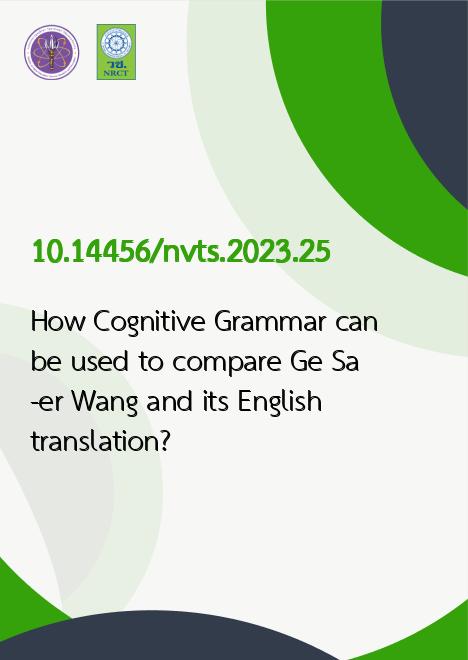
|
How Cognitive Grammar can be used to compare Ge Sa-er Wang and its English translation? |
|---|---|
| รหัสดีโอไอ | |
| Creator | 1. Yuqiao Zhou 2. Hazlina Abdul Halim 3. Diana Abu Ujum 4. Ling Yann Wong |
| Title | How Cognitive Grammar can be used to compare Ge Sa-er Wang and its English translation? |
| Publisher | IATIS and Chalermprakiat Center of Translation and Interpretation at Chulalongkorn University |
| Publication Year | 2566 |
| Journal Title | New Voices in Translation Studies |
| Journal Vol. | 28 |
| Journal No. | 2 |
| Page no. | - |
| Keyword | Tibetan myth, translation of ethnic minority literature, Cognitive Grammar, Text World Theory, world-builder, Ge Sa-er Wang |
| URL Website | https://newvoices.arts.chula.ac.th/ |
| Website title | New Voices in Translation Studies |
| ISSN | 1819-5644 |
| Abstract | The Ge Sa-er (also known as Gesar) saga is a myth from the ethnic minority Tibetan areas in China. By creating a parallel corpus of thirteen stories from《格萨尔王》 Ge Sa-er Wang “King Ge Sa-er” (Alai 2009) and their English translations, this article seeks to explore the meaning of culture-specific world-builders from reading the translation. World-builders point to such elements as locations, characters and objects; they play a significant role in constructing text-words which represent people’s understanding of a text. To examine the meaning of culture-specific world-builders, this research draws on the concepts of domain from Cognitive Grammar (Langacker 2008). A domain is defined as any type of concept, and a set of domains together form the meaning of an item. The results of this article reveal that the use of an equivalent word to translate a culture-specific world-builder does not guarantee an equivalent meaning of this world-builder in the translation. Instead, the meaning of this world-builder in the English translation is determined by the construction of the domains of a culture-specific world-builder in that version. The key contribution of this research is the new perspective that it provides on the use, and importance, of domains in translation studies. |
